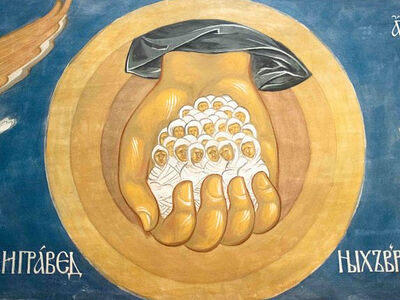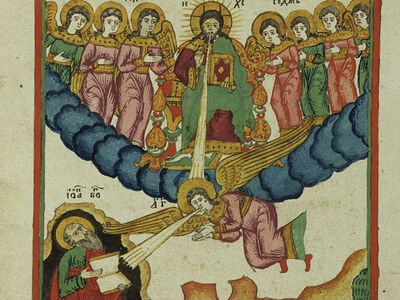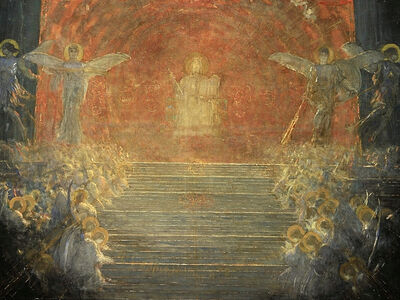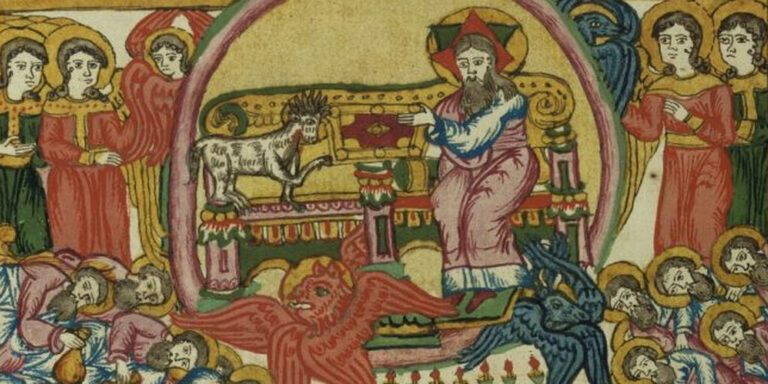Revelation: Removing the Veil
This revelation was given by God to the Apostle John because we needed to know it.
Part 1,

If Christ Is With Us, Death Is Defeated
The book of Revelation teaches us a lot, especially when we begin to carefully delve into its words, when we see how Christ holds the world in His hands and acts with wisdom in all things.
Part 2,

Why Did the Lord Leave Man the Book of Revelation?
Only the people of God, the saints, can receive revelations from God, and only they can interpret them, because a revelation, words from God, is given from God, from the Holy Spirit.
Part 3,

For the Time Is at Hand…
We have to understand that God acts outside of time, and the events of Revelation don’t relate only to the end times.
Part 4,

Blessed Is He That Readeth…
Christ sent the revelation through an angel to His servant the Apostle and Evangelist John, who conveyed the word of God and the testimony of Jesus Christ about what he saw and heard.
Part 5,

He Hath Made Us Kings and Priests
A man who is close to God, my dears, truly feels like a king—he has no need of anything. At the same time, he may have absolutely nothing.
Part 6,

John, Our Companion in Tribulation, and in the Kingdom and Patience of Jesus Christ
One of the most significant and frequent references to the Holy Trinity is in the text of Revelation.
Part 7,

Because Thou Hast Left Thy First Love…
The greatest miracle is that the Church exists.
Part 8,

Fear None of Those Things Which Thou Shalt Suffer
Thus, God says the following: He is the First and the Last, the Beginning and the End. Nothing exists outside of Him; in Him is everything. He is the Beginning and End of all things.
Part 9,

Holding Fast to the Name of Christ
To hold fast the name of God is a blessing; it’s martyrdom, and it’s a confession.
Part 10,

Sin Is Marriage with Satan
Sin will never lead us to good; it brings only evil, torment, and suffering. It’s the consequence of our deeds, not the punishment of God.
Part 11,

Remember Where You Fell From
We have to examine ourselves, whether we’re alive or not. And how can we know that someone has died?
Part 12,

Every Obstacle Is for our Good
The book of Revelation was written to help us trust in Christ, to hope in Christ, and to know that Christ will prevail in the end, and that we’ll all inherit the Kingdom of God—that our goal is the Kingdom of God.
Part 13,

“I Would Thou Wert Cold or Hot”
What is the sign of holy people? For those saints whom we have known in our days and who still live among us, perhaps already elderly, even 100 years old, it’s a living soul.
Part 14,

On the Seven-Sealed Book
The Apostle John greatly wept because there was no one worthy to come and take this book and open it and look upon it.
“Let every breath praise the Lord”

Icon of the Nativity of Christ, “Let Every Breath Praise the Lord”
Let’s say that this vision, this experience of the Apostle John, who saw how everything praises God and becomes a communicant of the Divine presence, is often repeated in Holy Scripture (Let every breath praise the Lord [Ps. 150:5]—clouds, birds, beasts—everything). In their spiritual lives, the saints often contemplated the glorification of God, in which participated all of creation, every creature—with its own voice, in its own way. That doesn’t mean that rocks and trees possess rationality, but every creation of God has its power and ability to hymn God with its presence (God knows how). And all of this was created for man. I remember how once Elder Paisios told us about his first spiritual experience among many others. After a particular great sorrow and a very serious temptation, he was in his cell and saw in the Spirit all of creation—every star, the whole earth, every planet, even the depths of the sea. Imagine, it’s possible to see everything before you! And all of it was blessing and glorifying God, saying that everything was created for man to bring him into communion with God the Father.
Everything sang the praises of the One sitting upon the throne and the Lamb, concluding with the words: Blessing, and honour, and glory, and power … for ever and ever.
The phrase “Glory to the Father and to the Son and to the Holy Spirit, both now and ever and unto the ages of ages” is commonly repeated in church. While we may say it quickly and move on, the depth of these words is truly amazing. A priest once shared with me how, during his ordination, the Holy Spirit opened up time before him and he saw the blessing he uttered spreading across the ages. Our words have a lasting impact that extends beyond our immediate surroundings. Just as technology allows us to communicate instantly across vast distances, the power of our words reaches into eternity. St. Kosmas of Aetolia foresaw advancements in communication that have since become reality, showing us that nothing is truly lost. The Word of God, like our words, transcends time and space. The four and twenty elders prostrated themselves and worshiped the eternal and living One (Rev. 5:13-14). This is a declaration of the divinity of our Lord Jesus Christ.
Moving on to the grand revelations, the Apostle witnessed the Lamb opening the seals of a book, a symbol of Christ’s incarnation. The seals being opened signify significant events that have already occurred, are happening presently, or are yet to come.
The first seal revealed a white horse with a rider holding a bow and a crown, going out to conquer. This imagery represents Christ going forth to conquer.
The second seal unveiled a red horse ridden by a figure given the power to take peace from the earth, allowing people to kill one another. This symbolizes the consequences of human sin, rather than God endorsing such violence.
The removal of the third seal brought forth a black horse with a rider holding scales, indicating scarcity of food. Despite the hardships caused by sin, God’s righteousness ensures essential provisions like oil and wine remain untouched.
These visions from Revelation serve as warnings and reminders of the consequences of human actions, emphasizing that individuals are accountable for their choices and not merely fulfilling predestined prophecies. Upon opening the fourth seal, a voice from the fourth beast called for the vision of a pale horse ridden by Death, followed by Hell. This horseman had the authority to kill a fourth of the earth’s population through various means. The imagery of the pale horse symbolizes the devastating power of Death, unleashed due to human sinfulness. As the end times approach, such destruction and evil will only increase, as Christ foretold.
In the vision of the fifth seal, the souls of martyrs who died for their faith were seen under the altar, crying out for justice. Their sacrifice and fidelity to God led them to eternal rest, awaiting the arrival of more martyrs who would join them. This vision reaffirms the immortality of the soul and the ultimate justice of God, who will vindicate those who suffered unjustly. The martyrs’ plea for justice highlights God’s desire for repentance and love, rather than punishment.
The martyrs were given white robes and told to wait a little longer for their fellow servants to join them in martyrdom. This message encourages those who are willing to sacrifice their lives for Christ to persevere, knowing that their ultimate reward and glory as martyrs is worth the wait. Let’s discuss the sixth seal: And I witnessed when He opened the sixth seal, and there was a great earthquake; the sun turned black like sackcloth made of hair, and the moon became like blood; and the stars of heaven fell to the earth, like a fig tree dropping its unripe figs when shaken by a strong wind. The sky receded like a scroll being rolled up, and every mountain and island was moved from its place. The kings of the earth, the nobles, the commanders, the rich, the mighty, and every slave and free person hid in caves and among the rocks of the mountains. They called to the mountains and the rocks, “Fall on us and hide us from the face of Him who sits on the throne and from the wrath of the Lamb! For the great day of their wrath has come, and who can withstand it?” (Rev. 6:12-17).
Thus concludes the sixth seal. The end of this seal signifies a great catastrophe; people scatter in fear, and in their despair, fear, and horror, they plead for the rocks to conceal them, sensing the wrath of God. Although God is not wrathful in the way we understand, our sins instill fear of God in us. A person who loves God does not fear Him, but one who lives in sin does. The guilty feel the wrath of God, as if a disaster has befallen us. However, it is not God who is angry and destroys us, but rather the sins of humanity that bring about destruction.
Revelation was written to convey the hopeful message that despite all that is, was, and will be, we should not despair or be frightened. We should have faith that God will ultimately prevail. A person of God should fear nothing and instead hold onto a blessed hope, an optimistic anticipation of the eternal Kingdom of God.
Source link

